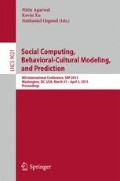Abstract
Despite a growing body of research into computational models of social psychological processes, direct empirical grounding for these models remains an elusive goal. This is largely due to the difficulty of measuring modelled characteristics of social groups. This paper presents a methodology combining supervised topic models with traditional psycho-linguistic research as a first step towards such a goal. The method is applied to a collection of over a million tweets from the Twitter ‘pro-anorexia’ community.
Access this chapter
Tax calculation will be finalised at checkout
Purchases are for personal use only
Preview
Unable to display preview. Download preview PDF.
References
Blei, D.M., Ng, A.Y., Jordan, M.I.: Latent dirichlet allocation. The Journal of Machine Learning Research 3, 993–1022 (2003)
Dann, E.: The Thin Ideal, Female Identity and Self-Worth: An Exploration of Language Use. Honours thesis, Department of Psychology, The ANU, Australia (2011)
Mimno, D., Blei, D.: Bayesian checking for topic models. In: Conference on Empirical Methods in Natural Language Processing, EMNLP 2011 (2011)
Newman, D., Bonilla, E., Buntine, W.: Improving topic coherence with regularized topic models. In: Advances in Neural Information Processing Systems (2011)
Pritchard, J.K., Stephens, M., Donnelly, P.: Inference of population structure using multilocus genotype data. Genetics 155(2), 945–959 (2000)
Tausczik, Y.R., Pennebaker, J.W.: The psychological meaning of words: Liwc and computerized text analysis methods. Journal of Language and Social Psychology 29(1), 24–54 (2010)
Author information
Authors and Affiliations
Corresponding author
Editor information
Editors and Affiliations
Rights and permissions
Copyright information
© 2015 Springer International Publishing Switzerland
About this paper
Cite this paper
Wood, I. (2015). Using Topic Models to Measure Social Psychological Characteristics in Online Social Media. In: Agarwal, N., Xu, K., Osgood, N. (eds) Social Computing, Behavioral-Cultural Modeling, and Prediction. SBP 2015. Lecture Notes in Computer Science(), vol 9021. Springer, Cham. https://doi.org/10.1007/978-3-319-16268-3_35
Download citation
DOI: https://doi.org/10.1007/978-3-319-16268-3_35
Published:
Publisher Name: Springer, Cham
Print ISBN: 978-3-319-16267-6
Online ISBN: 978-3-319-16268-3
eBook Packages: Computer ScienceComputer Science (R0)

